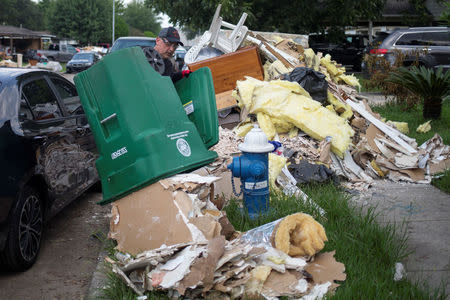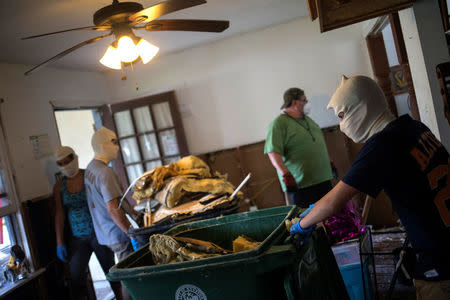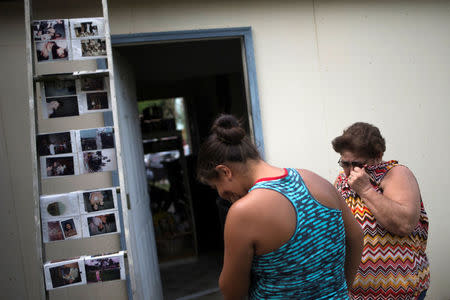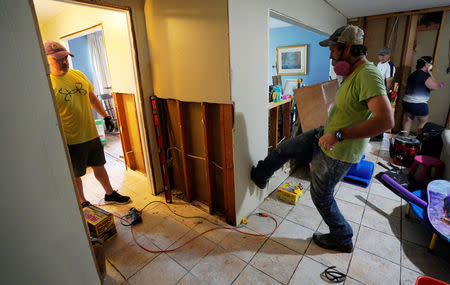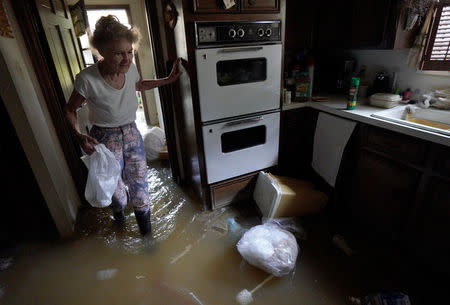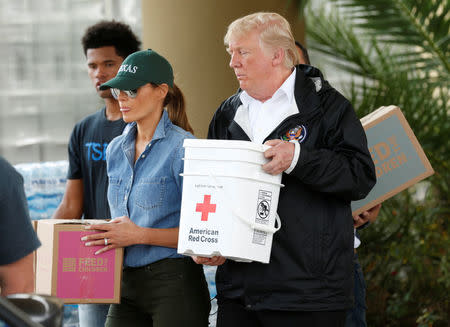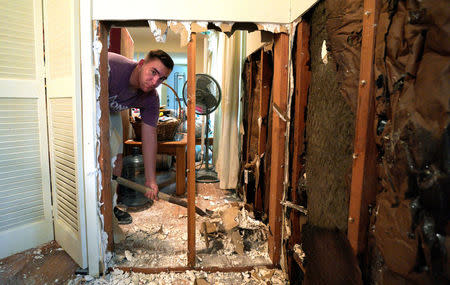Funding battle looms as Texas sees Harvey damage at up to $180 billion
By Marianna Parraga and Gary McWilliams HOUSTON (Reuters) - U.S. Treasury Secretary Steven Mnuchin on Sunday challenged Congress to raise the government's debt limit in order to free up relief spending for Hurricane Harvey, a disaster that the governor of Texas said had caused up to $180 billion in damage. Harvey, which came ashore on Aug. 25 as the most powerful hurricane to hit Texas in more than 50 years, has killed an estimated 50 people, displaced more than 1 million and damaged some 200,000 homes in a path of destruction stretching for more than 300 miles (480 km). As the city of Houston and the region's critical energy infrastructure began to recover nine days after the storm hit, the debate over how to pay for the disaster played out in Washington. Texas Governor Greg Abbott estimated damage at $150 billion to $180 billion, calling it more costly than Hurricanes Katrina or Sandy, which devastated New Orleans in 2005 and New York in 2012. The administration of President Donald Trump has asked Congress for an initial $7.85 billion for recovery efforts, a fraction of what will eventually be needed. Even that amount could be delayed unless Congress quickly increases the government's debt ceiling, Mnuchin said, as the United States is on track to hit its mandated borrowing limit by the end of the month unless Congress increases it. "Without raising the debt limit, I am not comfortable that we will get money to Texas this month to rebuild," Mnuchin told Fox News. Republican lawmakers, who control both houses of Congress, have traditionally resisted raising the debt ceiling, but linking the issue to Harvey aid could force their hand with people suffering and large areas of the fourth-largest U.S. city under water. Beyond the immediate funding, any massive aid package faces budget pressures at a time when Trump is advocating for tax reform or tax cuts, leading some on Capitol Hill to suggest aid may be released in a series of appropriations. Katrina set the record by costing U.S. taxpayers more than $110 billion. In advocating for funds to help rebuild his state, Abbott said damage from Harvey would exceed that. 95 PERCENT DRY Houston Mayor Sylvester Turner said the city expected most public services and businesses to be restored by Tuesday, the first day after Monday's Labor Day holiday. "Over 95 percent of the city is now dry. And I'm encouraging people to get up and let's get going," Turner told NBC News. Even so, Houston mandated the evacuation of thousands of people on the western side of town on Sunday to accommodate the release of water from two reservoirs that otherwise might sustain damage. The storm stalled over Houston, dumping more than 50 inches (1.3 m) on the region. Houston cut off power to homes on Sunday to encourage evacuations. The area was closed off on Sunday and military vehicles were stationed on the periphery to take people out. Karen Waltmon, 58, who was returning to her home in one of the neighborhoods, said she wondered if parts of the city would have to be razed. "I feel a lot of Houston is drying out, and I don’t want them to forget about us,” she said. About 37,000 refugees stayed overnight in 270 shelters in Texas plus another 2,000 in seven Louisiana shelters, the highest number reported by the American Red Cross. Some 84,700 homes and businesses were without power on Sunday, down from a peak of around 300,000, according to the region's major electric companies. In Crosby, Texas, an Arkema chemical plant that ran out of electricity needed to keep volatile organic peroxide refrigerated will burn the remaining containers as a "proactive measure," company and Harris County fire officials said in a statement. Officials last week evacuated residents and set up a 1.5-mile (2.4-km) perimeter around the area. Energy disruptions pushed up gasoline futures to a two-year high ahead of the holiday weekend, but major refineries started to come back online on Friday. Colonial Pipeline, the biggest U.S. fuel system, expects to reopen a Texas segment of its network on Monday, when it will resume transporting distillates from Houston to Hebert, Texas, the company said on Sunday, adding that it would be ready to start moving gasoline on Tuesday. Those repairs would restore to normal Colonial's entire pipeline from Houston to Linden, New Jersey, relieving shortages between Texas and the U.S. Northeast. (Reporting by Marianna Parraga and Gary McWilliams in Houston and Steve Holland in Washington; Writing by Daniel Trotta; Editing by Phil Berlowitz and Andrew Hay)

